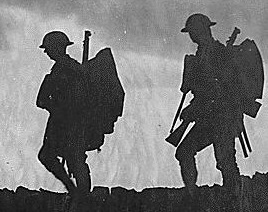
Then some soldiers asked him, “And what should we do?” He replied, “Don’t extort money and don’t accuse people falsely—be content with your pay.”
Luke 3:14 (NIV)
Though he would die by the sword, John the Baptist did not question the legitimacy of the sword. Though his death would be unjust, he did not doubt that justice could demand killing.
John had the perfect opportunity to condemn the soldiers for their soldiering. This was the man who called the Pharisees and Sadducees a “brood of vipers” (Matt. 3:7), the man who said that those who rejected Jesus would fatally face God’s wrath (John 3:36). Here then was John’s prime occasion to shame these troops for their use of arms, but he did not do this. His only counsel concerned money and veracity.
If thieves had come to John with the same question, “What should we do?” it is inconceivable that he would have said something as benign as “Keep your promises to one another, and don’t forget to spend time with your children.” This would have been absurd since the very profession of thievery was wicked. Similarly, it is unthinkable that he would have merely told prostitutes to avoid blasphemy and slanderers to mind their grammar. This would have been failure to address the root moral problem.
Tax collectors were notoriously treacherous in John’s day. They had the freedom to exaggerate assessments, and they enjoyed the backing of the Romans should the locals protest. It is no wonder the people despised them. But when tax collectors asked him what they should do, he simply said, “Don’t collect any more than you are required to” (Luke 3:13). The reason for John’s minimal response is obvious. Tax collecting in itself was an acceptable occupation. The same was true for military service.
It is, of course, a risky thing to argue from silence. If John the Baptist’s failure to condemn warfare was the only justification for war, then soldiers would stand on doubtful ground. But in Romans 13:1-7, Paul again spoke a godly word of clarification. In this instance, he explained that use of the sword was not only permissible; it could even be an act of service under God.
The traditional “peace churches” (Brethren, Quakers, Mennonites) have through the centuries refused to honor combat. They have now been joined by the mainline churches, where a romantic view of man rules. According to their understanding, to validate the sword would be to question and even retard the peaceful flowering of mankind.
John the Baptist suffered no such illusion. He showed soldiers the respect they deserved, and today’s Christians should do no less. But neither should churches shrink from offering moral and spiritual counsel to those who bear arms for their country. To don the uniform is not to enjoy a moral holiday, either in peace or war. Indeed, to don the uniform is to undertake grave responsibility – dutifully honoring both God and man.
//
Could we talk more about this off line, if you have time and interest?
God bless.
Java